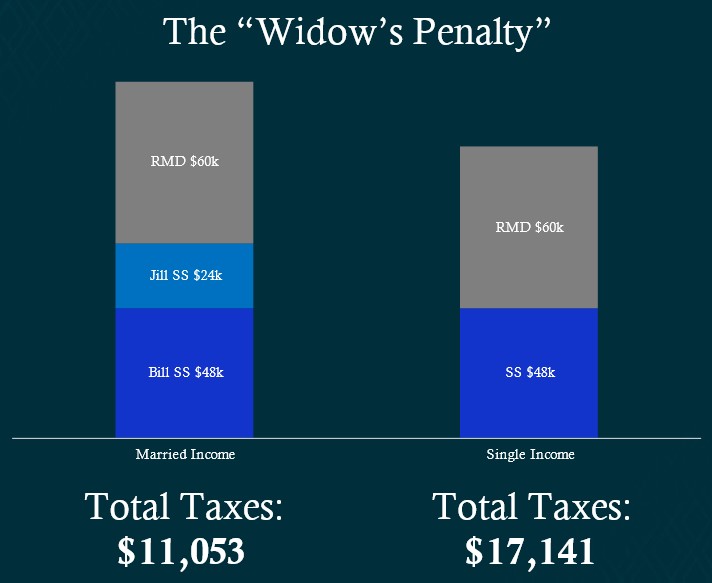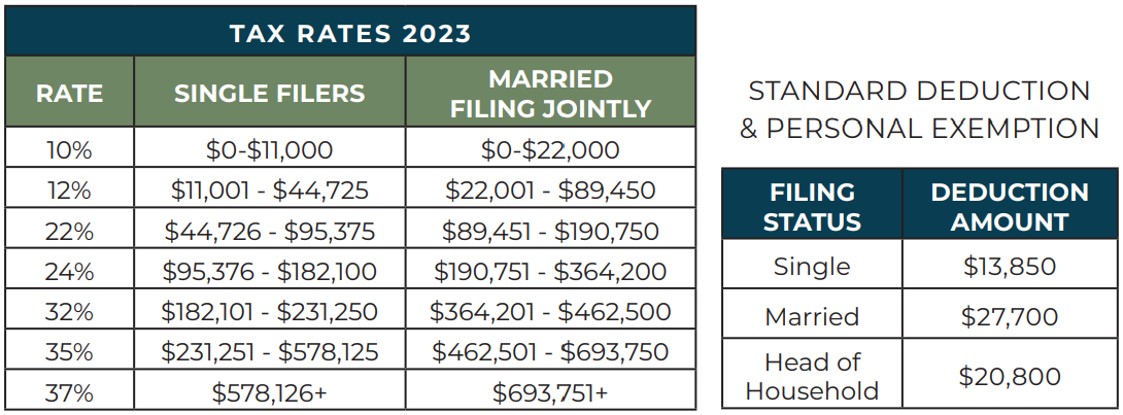Don’t Let the 'Widow's Penalty' Blindside You: How to Prepare
If one spouse passes away, the surviving spouse could pay nearly double the amount of income taxes. Are you planning for this?


Profit and prosper with the best of Kiplinger's advice on investing, taxes, retirement, personal finance and much more. Delivered daily. Enter your email in the box and click Sign Me Up.
You are now subscribed
Your newsletter sign-up was successful
Want to add more newsletters?

Delivered daily
Kiplinger Today
Profit and prosper with the best of Kiplinger's advice on investing, taxes, retirement, personal finance and much more delivered daily. Smart money moves start here.

Sent five days a week
Kiplinger A Step Ahead
Get practical help to make better financial decisions in your everyday life, from spending to savings on top deals.

Delivered daily
Kiplinger Closing Bell
Get today's biggest financial and investing headlines delivered to your inbox every day the U.S. stock market is open.

Sent twice a week
Kiplinger Adviser Intel
Financial pros across the country share best practices and fresh tactics to preserve and grow your wealth.

Delivered weekly
Kiplinger Tax Tips
Trim your federal and state tax bills with practical tax-planning and tax-cutting strategies.

Sent twice a week
Kiplinger Retirement Tips
Your twice-a-week guide to planning and enjoying a financially secure and richly rewarding retirement

Sent bimonthly.
Kiplinger Adviser Angle
Insights for advisers, wealth managers and other financial professionals.

Sent twice a week
Kiplinger Investing Weekly
Your twice-a-week roundup of promising stocks, funds, companies and industries you should consider, ones you should avoid, and why.

Sent weekly for six weeks
Kiplinger Invest for Retirement
Your step-by-step six-part series on how to invest for retirement, from devising a successful strategy to exactly which investments to choose.
The “widow’s penalty” occurs when a person’s tax filing status goes from married filing jointly to single. This change can cause the surviving spouse to have to pay nearly double the taxes compared to what they were paying.
I am going to share an example of a client of ours (we’ll call her Jill) whose spouse (we’ll change his name to Bill) passed away prematurely before Jill started working with us. Their situation is illustrated in the graphic below. Let me walk you through the impact of the widow’s penalty and how severe it was for Jill.

As you can see with this chart, while Bill and Jill were together, they filed their taxes jointly, each received Social Security, and both were older than 73, which means they were forced to take required minimum distributions (RMDs) from the money they had saved in IRAs over all their working years. All their income combined resulted in a tax bill of $11,053. To me, that is a lot of money to have to pay the government, considering Jill and Bill are no longer working. Unfortunately, it gets worse.
From just $107.88 $24.99 for Kiplinger Personal Finance
Become a smarter, better informed investor. Subscribe from just $107.88 $24.99, plus get up to 4 Special Issues

Sign up for Kiplinger’s Free Newsletters
Profit and prosper with the best of expert advice on investing, taxes, retirement, personal finance and more - straight to your e-mail.
Profit and prosper with the best of expert advice - straight to your e-mail.
When Bill passed, Jill was required to continue the same RMD amount because she was the beneficiary and received all the investments. However, there were two major changes that occurred. The first was that Jill’s Social Security fell off. When one spouse passes away, their Social Security income goes away, and the higher of the two remains. It is great that Jill can take the higher of the two but unfortunate that she will have a loss of income from what she was used to.
This is less of concern since it is typically correct that most surviving spouses will not need 100% of what they needed while their spouse was living, so we can manage that loss. The second change was that Jill’s tax status went from married filing jointly to single.
I have already indicated how severe this is and how it can cause the surviving spouse to pay nearly double the amount of taxes. Let’s explore the tax brackets to understand why this is the case.

As you can see from these charts, two things fuel the fire for the widow’s penalty:
- The standard deduction gets cut in half. This means the surviving spouse will be left with less tax-free income.
- The tax brackets are smaller. For example, if you have $85,000 of taxable income and you are married filing jointly, then you are in the 12% tax bracket, but if you are single with $85,000 of taxable income, then you will be in the 22% tax bracket. See how this can be an issue? This is how that near doubling of taxes can occur.
It bothers me that not only will the surviving spouse have less income, but they will also have to pay more taxes, which leaves them with less money during the time when they need it the most.
How do we plan for this? By utilizing the married filing jointly tax brackets while you can. One spouse is likely to pass away first, so be prepared when that happens.
Also, consider that tax rates may be the lowest we’ll see because they are among historical lows, and most experts expect them to increase due to our country's current debt crisis and overspending. Now may be the best time to pay taxes on those tax-deferred vehicles like your IRA and 401(k) while this tax “sale” is here and while you are still in the more generous married filing jointly tax brackets. You could utilize strategies like a Roth conversion to maximize these types of opportunities.
What else you can do
Another consideration is optimizing when you take Social Security to ensure your spouse will be left with the highest benefit when you pass away. Lastly, if you are going to be drawing larger RMDs in the future, now is the time to start reducing that potential liability, to leave your spouse with less taxable income in the future when it matters the most.
To close, it truly bothers me how severe the widow’s penalty is. Jill was penalized $30,000 per year ($24,000 from the loss of income and $6,000 from the increased tax bill). This is something that can be devastating to surviving spouses, especially when one spouse passes away early — and for those who have done a great job saving. In sum, the tax code penalizes those who have saved and those who have had a spouse pass early.
Unfortunately, you can change only what you can control. We cannot control the tax code or laws, but we can control how we plan for it. So, let's get planning now and make sure our loved ones can continue on with the plan they deserve.
Related Content
- Social Security Strategies to Help Widows Replace Lost Income
- Should I Hire an Estate Planning Attorney Now That I Am a Widow?
- Optimize Your Taxes With These Two Common Strategies
- Social Security for Widowed Parents Falls Far Short of Need
- How to Qualify for Social Security Spousal and Survivor Benefits
Profit and prosper with the best of Kiplinger's advice on investing, taxes, retirement, personal finance and much more. Delivered daily. Enter your email in the box and click Sign Me Up.

Joe F. Schmitz Jr., CFP®, ChFC®, CKA®, is the founder and CEO of Peak Retirement Planning, Inc., which was named the No. 1 fastest-growing private company in Columbus, Ohio, by Inc. 5000 in 2025. His firm focuses on serving those in the 2% Club by providing the 5 Pillars of Pension Planning. Known as a thought leader in the industry, he is featured in TV news segments and has written three bestselling books: I Hate Taxes (request a free copy), Midwestern Millionaire (request a free copy) and The 2% Club (request a free copy).
Investment Advisory Services and Insurance Services are offered through Peak Retirement Planning, Inc., a Securities and Exchange Commission registered investment adviser able to conduct advisory services where it is registered, exempt or excluded from registration.
-
 Dow Adds 1,206 Points to Top 50,000: Stock Market Today
Dow Adds 1,206 Points to Top 50,000: Stock Market TodayThe S&P 500 and Nasdaq also had strong finishes to a volatile week, with beaten-down tech stocks outperforming.
-
 Ask the Tax Editor: Federal Income Tax Deductions
Ask the Tax Editor: Federal Income Tax DeductionsAsk the Editor In this week's Ask the Editor Q&A, Joy Taylor answers questions on federal income tax deductions
-
 States With No-Fault Car Insurance Laws (and How No-Fault Car Insurance Works)
States With No-Fault Car Insurance Laws (and How No-Fault Car Insurance Works)A breakdown of the confusing rules around no-fault car insurance in every state where it exists.
-
 For the 2% Club, the Guardrails Approach and the 4% Rule Do Not Work: Here's What Works Instead
For the 2% Club, the Guardrails Approach and the 4% Rule Do Not Work: Here's What Works InsteadFor retirees with a pension, traditional withdrawal rules could be too restrictive. You need a tailored income plan that is much more flexible and realistic.
-
 Retiring Next Year? Now Is the Time to Start Designing What Your Retirement Will Look Like
Retiring Next Year? Now Is the Time to Start Designing What Your Retirement Will Look LikeThis is when you should be shifting your focus from growing your portfolio to designing an income and tax strategy that aligns your resources with your purpose.
-
 I'm a Financial Planner: This Layered Approach for Your Retirement Money Can Help Lower Your Stress
I'm a Financial Planner: This Layered Approach for Your Retirement Money Can Help Lower Your StressTo be confident about retirement, consider building a safety net by dividing assets into distinct layers and establishing a regular review process. Here's how.
-
 The 4 Estate Planning Documents Every High-Net-Worth Family Needs (Not Just a Will)
The 4 Estate Planning Documents Every High-Net-Worth Family Needs (Not Just a Will)The key to successful estate planning for HNW families isn't just drafting these four documents, but ensuring they're current and immediately accessible.
-
 Love and Legacy: What Couples Rarely Talk About (But Should)
Love and Legacy: What Couples Rarely Talk About (But Should)Couples who talk openly about finances, including estate planning, are more likely to head into retirement joyfully. How can you get the conversation going?
-
 How to Get the Fair Value for Your Shares When You Are in the Minority Vote on a Sale of Substantially All Corporate Assets
How to Get the Fair Value for Your Shares When You Are in the Minority Vote on a Sale of Substantially All Corporate AssetsWhen a sale of substantially all corporate assets is approved by majority vote, shareholders on the losing side of the vote should understand their rights.
-
 How to Add a Pet Trust to Your Estate Plan: Don't Leave Your Best Friend to Chance
How to Add a Pet Trust to Your Estate Plan: Don't Leave Your Best Friend to ChanceAdding a pet trust to your estate plan can ensure your pets are properly looked after when you're no longer able to care for them. This is how to go about it.
-
 Want to Avoid Leaving Chaos in Your Wake? Don't Leave Behind an Outdated Estate Plan
Want to Avoid Leaving Chaos in Your Wake? Don't Leave Behind an Outdated Estate PlanAn outdated or incomplete estate plan could cause confusion for those handling your affairs at a difficult time. This guide highlights what to update and when.